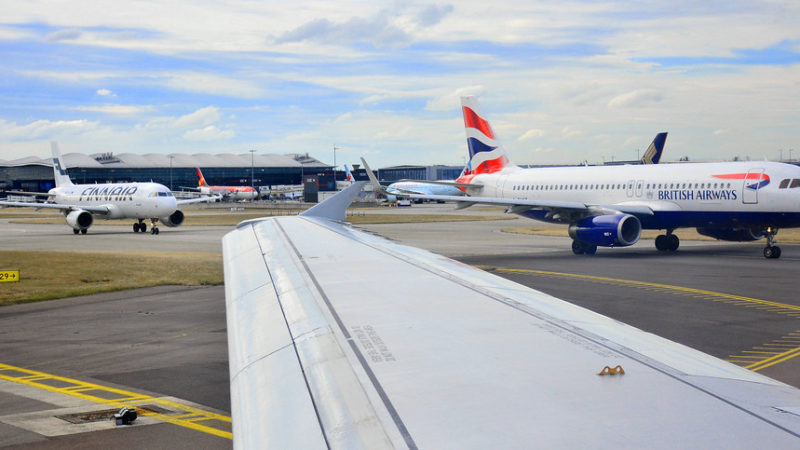'One of the biggest obstacles to decarbonising the aviation industry is the amount of jet fuel being used per flight.'

Wera Hobhouse is the Liberal Democrats’ Climate Change and Transport Spokesperson and MP for Bath
The aviation industry must embrace the transition to sustainable aviation fuel (SAF) if we are to have any hope of securing the future of green transport. But for this to be achieved, the government must first demonstrate their commitment to decarbonising the industry with a clear and decisive strategy.
At the end of November, Virgin Atlantic made history as their Flight100 took to the skies. This was the first commercial flight, powered by 100% sustainable aviation fuel, to cross the Atlantic. It is high time that the rest of the aviation industry follows in their impressive footsteps.
On the 28th of November 2023, Flight100 flew from Heathrow to JFK Airport in New York, making history as the first transatlantic commercial flight powered by 100% SAF. In the run up to take off, I met with representatives from Virgin Atlantic to discuss how the aviation industry can work towards increasing flights powered by 100% SAF across the industry.
Flight100’s success was a year in the making. It took a team of incredible experts and input from the government and partners such as Boeing, Rolls-Royce, Imperial College London and the University of Sheffield. Virgin Atlantic used SAF as a direct replacement for traditional jet fuel, while using existing airframes, engines, and fuel infrastructure. The SAF for the flight was produced through the Hydroprocessed Esters and Fatty Acids (HEFA) pathway and used synthetic aromatic kerosene (SAK) SAF at an 88% and 12% blend ratio.
It is important to note that reducing the need to fly in the first place will go a long way to cutting global emissions and supporting green transport. We must improve public transport infrastructure to help reduce emissions from cars travelling to airports, as well as minimise the number of short-haul internal flights powered by jet fuel where direct rail alternatives exist.
Nevertheless, one of the biggest obstacles to decarbonising the aviation industry is the amount of jet fuel being used per flight. A jumbo jet carries about 240,000 litres of jet fuel which it burns through at a rate of four litres per second. Sustainable aviation fuel has the potential to drastically reduce carbon emissions across the entire industry. It can deliver CO2 lifecycle emissions savings of more than 70% compared to traditional jet fuel and could reduce emissions by 25% on short-haul flights alone.
The reduction in CO2 emissions when using SAF is vital. Sustainable aviation fuel has the potential to be a game changer for the future of green transport, but the government must work with the industry to ensure their strategy to transition to sustainable fuels is achievable. Such an array of partners working on Flight100, especially those from the transport industry- such as Boeing and Rolls-Royce, demonstrate there is a huge appetite for more sustainable travel. However, the government must help the industry to meet this demand with a decisive strategy. This is why I have long been advocating for sustainable aviation fuel in Parliament.
The historic Flight100 shows that a transition to 100% SAF powered flights is achievable with the right policies in place. The synthetic fuels that make up SAF can behave in a similar way to conventional jet fuel, kerosene. This means that existing aeroplane engines, and airframes would not need to be drastically redesigned, as seen with Flight100. Moreover, the government already has existing structures in place to mandate the creation of synthetic fuels via the Renewable Transport Fuel Obligation. The aviation industry has shown the will to create and use SAF, with Virgin Atlantic committing to continue sustainable flights if enough SAF is made, but they need clear guidance from the government to do so.
By not taking action with a decisive strategy to decarbonise the aviation industry, the government is causing the UK to miss out on the 10,000 jobs and £1.8bn in GVA per annum by 2030. So far, they have committed to introducing a revenue certainty mechanism to support sustainable aviation fuel (SAF) production in the UK. They are requiring at least 10% of jet fuel to be made from sustainable feedstocks by 2030; but, in order to do this, the aviation industry urgently needs certainty and decisive policy action from the government to invest in sustainable fuel production.
SAF is one of the most viable options for decarbonising the aviation sector. Many industry leaders have already shown willingness to transition to SAF, and it is clear that this necessary transition is an achievable one too. But to make real progress, we need the government’s support for a clear strategy to give the industry the certainty it needs.
Left Foot Forward doesn't have the backing of big business or billionaires. We rely on the kind and generous support of ordinary people like you.
You can support hard-hitting journalism that holds the right to account, provides a forum for debate among progressives, and covers the stories the rest of the media ignore. Donate today.



